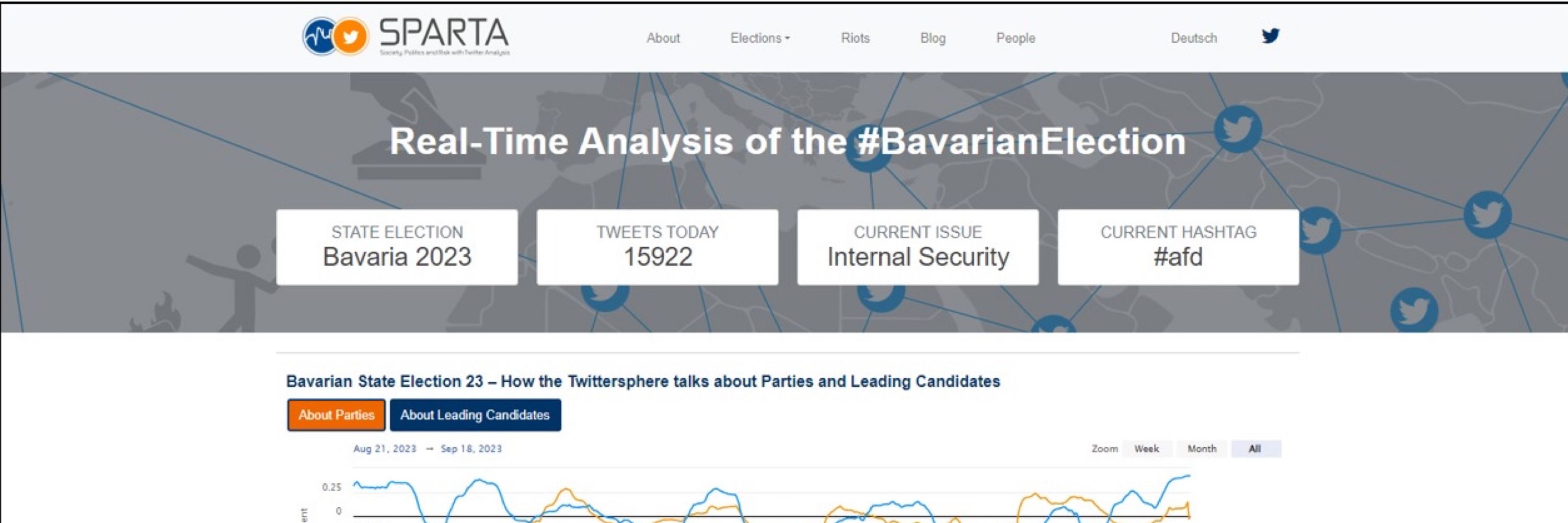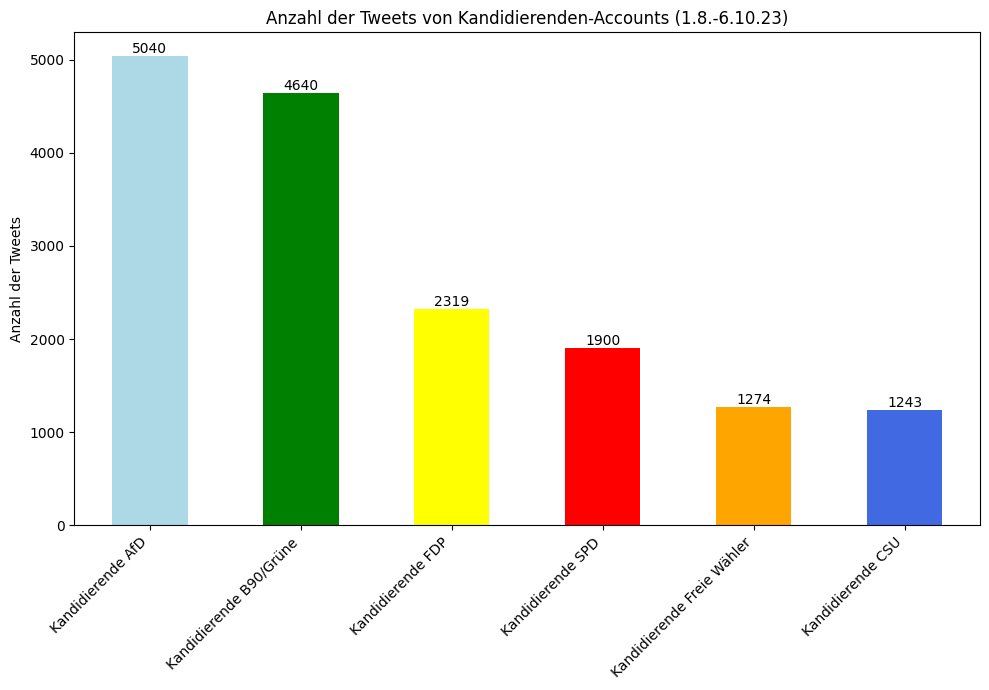
Wiebke Drews
@wiebkedrews.bsky.social
Post-Doctoral Researcher at UniBw M 📚 PhD from EUI 👩💻 Research on digital campaigning, party competition and political communication at project SPARTA 🗳️
https://www.wiebkedrews.com/
https://dtecbw.de/sparta?lang=en
https://www.wiebkedrews.com/
https://dtecbw.de/sparta?lang=en
🌍 Why it matters
Our findings show that negative campaigning in multiparty systems is not random mudslinging. It’s a functional response to ideological crowding, shaped by issue salience and competition.
#PolCom #Elections #DigitalPolitics #CSS #NLP
Our findings show that negative campaigning in multiparty systems is not random mudslinging. It’s a functional response to ideological crowding, shaped by issue salience and competition.
#PolCom #Elections #DigitalPolitics #CSS #NLP
October 6, 2025 at 8:26 AM
🌍 Why it matters
Our findings show that negative campaigning in multiparty systems is not random mudslinging. It’s a functional response to ideological crowding, shaped by issue salience and competition.
#PolCom #Elections #DigitalPolitics #CSS #NLP
Our findings show that negative campaigning in multiparty systems is not random mudslinging. It’s a functional response to ideological crowding, shaped by issue salience and competition.
#PolCom #Elections #DigitalPolitics #CSS #NLP
📌 Key Findings
1️⃣ On salient, contested issues (economy, ecology) → higher spatial pressure = more negativity
2️⃣ On low-salience or depoliticized issues (culture, COVID-19) → higher spatial pressure = less negativity
3️⃣ Negativity is thus a strategic tool to stand out, when the issue context allows it
1️⃣ On salient, contested issues (economy, ecology) → higher spatial pressure = more negativity
2️⃣ On low-salience or depoliticized issues (culture, COVID-19) → higher spatial pressure = less negativity
3️⃣ Negativity is thus a strategic tool to stand out, when the issue context allows it
October 6, 2025 at 8:26 AM
📌 Key Findings
1️⃣ On salient, contested issues (economy, ecology) → higher spatial pressure = more negativity
2️⃣ On low-salience or depoliticized issues (culture, COVID-19) → higher spatial pressure = less negativity
3️⃣ Negativity is thus a strategic tool to stand out, when the issue context allows it
1️⃣ On salient, contested issues (economy, ecology) → higher spatial pressure = more negativity
2️⃣ On low-salience or depoliticized issues (culture, COVID-19) → higher spatial pressure = less negativity
3️⃣ Negativity is thus a strategic tool to stand out, when the issue context allows it
🛠️ Methods & Data
- 166,402 tweets 🐦 from 1,228 party accounts (7 Bundestag parties)
- NLP pipeline: Named Entity Recognition, stance detection (XLM-RoBERTa), issue dictionary
- A new measure of “spatial pressure” capturing issue-specific ideological crowding
- 166,402 tweets 🐦 from 1,228 party accounts (7 Bundestag parties)
- NLP pipeline: Named Entity Recognition, stance detection (XLM-RoBERTa), issue dictionary
- A new measure of “spatial pressure” capturing issue-specific ideological crowding
October 6, 2025 at 8:26 AM
🛠️ Methods & Data
- 166,402 tweets 🐦 from 1,228 party accounts (7 Bundestag parties)
- NLP pipeline: Named Entity Recognition, stance detection (XLM-RoBERTa), issue dictionary
- A new measure of “spatial pressure” capturing issue-specific ideological crowding
- 166,402 tweets 🐦 from 1,228 party accounts (7 Bundestag parties)
- NLP pipeline: Named Entity Recognition, stance detection (XLM-RoBERTa), issue dictionary
- A new measure of “spatial pressure” capturing issue-specific ideological crowding
🔍 What we explore
How parties used negative campaigning on specific issues during the 2021 German federal election – and how crowded ideological space (“spatial pressure”) shapes when parties go negative.
How parties used negative campaigning on specific issues during the 2021 German federal election – and how crowded ideological space (“spatial pressure”) shapes when parties go negative.
October 6, 2025 at 8:26 AM
🔍 What we explore
How parties used negative campaigning on specific issues during the 2021 German federal election – and how crowded ideological space (“spatial pressure”) shapes when parties go negative.
How parties used negative campaigning on specific issues during the 2021 German federal election – and how crowded ideological space (“spatial pressure”) shapes when parties go negative.
6/6 🌍 Why It Matters
How pivotal issues like COVID-19 are (de-)politicized on social media impacts the quality of democratic discourse in digital spaces.
Our findings stress the need to tackle echo chambers&foster critical, inclusive debates online.
#PolCom #COVID19 #BTW25 #EchoChambers #CSS #NLP
How pivotal issues like COVID-19 are (de-)politicized on social media impacts the quality of democratic discourse in digital spaces.
Our findings stress the need to tackle echo chambers&foster critical, inclusive debates online.
#PolCom #COVID19 #BTW25 #EchoChambers #CSS #NLP
December 10, 2024 at 7:48 PM
5/6 📌 Key Findings (cont’d):
2️⃣ Depoliticization:
Political actors largely avoided COVID-19 in electoral debates, sidelining critical public health discussions.
3️⃣ Selective politicization:
Health policy leaders like Lauterbach (SPD) & Spahn (CDU/CSU) couldn’t avoid the issue due to their roles.
2️⃣ Depoliticization:
Political actors largely avoided COVID-19 in electoral debates, sidelining critical public health discussions.
3️⃣ Selective politicization:
Health policy leaders like Lauterbach (SPD) & Spahn (CDU/CSU) couldn’t avoid the issue due to their roles.
December 10, 2024 at 7:48 PM
5/6 📌 Key Findings (cont’d):
2️⃣ Depoliticization:
Political actors largely avoided COVID-19 in electoral debates, sidelining critical public health discussions.
3️⃣ Selective politicization:
Health policy leaders like Lauterbach (SPD) & Spahn (CDU/CSU) couldn’t avoid the issue due to their roles.
2️⃣ Depoliticization:
Political actors largely avoided COVID-19 in electoral debates, sidelining critical public health discussions.
3️⃣ Selective politicization:
Health policy leaders like Lauterbach (SPD) & Spahn (CDU/CSU) couldn’t avoid the issue due to their roles.
4/6 📌 Key Findings:
1️⃣ Polarization via echo chambers:
Two groups dominated:
• “Safety-first” (strict measures)
• “Freedom-first” (anti-restrictions).
COVID-19 became a battleground for ideological divides.
1️⃣ Polarization via echo chambers:
Two groups dominated:
• “Safety-first” (strict measures)
• “Freedom-first” (anti-restrictions).
COVID-19 became a battleground for ideological divides.
December 10, 2024 at 7:48 PM
4/6 📌 Key Findings:
1️⃣ Polarization via echo chambers:
Two groups dominated:
• “Safety-first” (strict measures)
• “Freedom-first” (anti-restrictions).
COVID-19 became a battleground for ideological divides.
1️⃣ Polarization via echo chambers:
Two groups dominated:
• “Safety-first” (strict measures)
• “Freedom-first” (anti-restrictions).
COVID-19 became a battleground for ideological divides.
3/6 📊 Methods & Data
Analyzed X/Twitter data:
• 7.37M posts mentioning the election.
• 3.19M posts about COVID-19.
We calculated Echo Chamber Scores (ECS) based on retweet networks and studied political actors’ engagement in COVID-19 debates.
Analyzed X/Twitter data:
• 7.37M posts mentioning the election.
• 3.19M posts about COVID-19.
We calculated Echo Chamber Scores (ECS) based on retweet networks and studied political actors’ engagement in COVID-19 debates.
December 10, 2024 at 7:48 PM
3/6 📊 Methods & Data
Analyzed X/Twitter data:
• 7.37M posts mentioning the election.
• 3.19M posts about COVID-19.
We calculated Echo Chamber Scores (ECS) based on retweet networks and studied political actors’ engagement in COVID-19 debates.
Analyzed X/Twitter data:
• 7.37M posts mentioning the election.
• 3.19M posts about COVID-19.
We calculated Echo Chamber Scores (ECS) based on retweet networks and studied political actors’ engagement in COVID-19 debates.
2/6 🔍 What we explore:
How COVID-19 was discussed—or avoided—on X/Twitter during the 2021 German federal election campaign.
The pandemic was polarizing, debated within ideological echo chambers. Yet, many political actors strategically depoliticized the topic to avoid alienating voters.
How COVID-19 was discussed—or avoided—on X/Twitter during the 2021 German federal election campaign.
The pandemic was polarizing, debated within ideological echo chambers. Yet, many political actors strategically depoliticized the topic to avoid alienating voters.
December 10, 2024 at 7:48 PM
2/6 🔍 What we explore:
How COVID-19 was discussed—or avoided—on X/Twitter during the 2021 German federal election campaign.
The pandemic was polarizing, debated within ideological echo chambers. Yet, many political actors strategically depoliticized the topic to avoid alienating voters.
How COVID-19 was discussed—or avoided—on X/Twitter during the 2021 German federal election campaign.
The pandemic was polarizing, debated within ideological echo chambers. Yet, many political actors strategically depoliticized the topic to avoid alienating voters.
Explore #EUDigiParty and download it here: dataverse.harvard.edu/dataset.xhtm...
dataverse.harvard.edu
November 28, 2024 at 2:34 PM
Explore #EUDigiParty and download it here: dataverse.harvard.edu/dataset.xhtm...
🧵2/3: Designed for researchers in #polcomm, #partypolitics, & #CSS), #EUDigiParty supports in-depth analysis of digital party campaigns across Europe. It includes handles for #Facebook, #Instagram, #TikTok, #X / #Twitter, and #YouTube, plus Partyfacts-IDs for easy linking to other datasets.
dataverse.harvard.edu
November 28, 2024 at 2:34 PM
🧵2/3: Designed for researchers in #polcomm, #partypolitics, & #CSS), #EUDigiParty supports in-depth analysis of digital party campaigns across Europe. It includes handles for #Facebook, #Instagram, #TikTok, #X / #Twitter, and #YouTube, plus Partyfacts-IDs for easy linking to other datasets.
Reposted by Wiebke Drews
I can offer you ze german bubble
@ulrikeklinger.bsky.social
@sophiahunger.bsky.social
@jasminriedl.bsky.social
@wiebkedrews.bsky.social
@sebstier.bsky.social
@mikecowburn.bsky.social
@corinnaoschatz.bsky.social
@favstats.eu
@benguinaudeau.bsky.social
and myself ;)
@ulrikeklinger.bsky.social
@sophiahunger.bsky.social
@jasminriedl.bsky.social
@wiebkedrews.bsky.social
@sebstier.bsky.social
@mikecowburn.bsky.social
@corinnaoschatz.bsky.social
@favstats.eu
@benguinaudeau.bsky.social
and myself ;)
November 20, 2024 at 10:54 PM
I can offer you ze german bubble
@ulrikeklinger.bsky.social
@sophiahunger.bsky.social
@jasminriedl.bsky.social
@wiebkedrews.bsky.social
@sebstier.bsky.social
@mikecowburn.bsky.social
@corinnaoschatz.bsky.social
@favstats.eu
@benguinaudeau.bsky.social
and myself ;)
@ulrikeklinger.bsky.social
@sophiahunger.bsky.social
@jasminriedl.bsky.social
@wiebkedrews.bsky.social
@sebstier.bsky.social
@mikecowburn.bsky.social
@corinnaoschatz.bsky.social
@favstats.eu
@benguinaudeau.bsky.social
and myself ;)
Wir analysieren alle (Re-)Tweets der Kandidierenden von @AfD_Bayern, @Gruene_Bayern, @fdpbay, @BayernSPD, @fw_bayern und @CSU für ein Mandat im Landtag. 🗳️📊🐦
Unsere Echtzeitanalysen finden Sie hier: dtecbw.de/sparta
#ltwby23 #Bayernwahl2023 #Bayernwahl (4/4)
Unsere Echtzeitanalysen finden Sie hier: dtecbw.de/sparta
#ltwby23 #Bayernwahl2023 #Bayernwahl (4/4)

October 7, 2023 at 6:13 PM
Wir analysieren alle (Re-)Tweets der Kandidierenden von @AfD_Bayern, @Gruene_Bayern, @fdpbay, @BayernSPD, @fw_bayern und @CSU für ein Mandat im Landtag. 🗳️📊🐦
Unsere Echtzeitanalysen finden Sie hier: dtecbw.de/sparta
#ltwby23 #Bayernwahl2023 #Bayernwahl (4/4)
Unsere Echtzeitanalysen finden Sie hier: dtecbw.de/sparta
#ltwby23 #Bayernwahl2023 #Bayernwahl (4/4)

